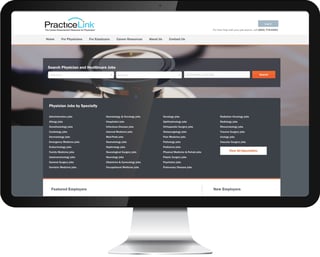
Given the widespread shortages in the physician workforce, physician recruiters need to explore alternative sources of healthcare providers, running from the expanded utilization of allied healthcare professionals to a greater utilization of International Medical Graduates (IMGs).
The recruitment of IMGs requires not only an assessment of the physician’s clinical skills and personal and professional qualities to work within a healthcare organization, but also an understanding of the fundamentals of U.S. immigration laws. But what oftentimes gets overlooked is that an organization’s immigration policies can serve as a powerful and proactive competitive recruitment tool.How to look at immigration law
It should not just be enough to go through the motions of qualifying an IMG for an appropriate visa. Rather, the savvy recruiter should actively look to immigration law as a highly effective competitive recruitment tool that can:
- Communicate the commitment of the employing healthcare organization to the IMG’s personal and professional long-term development
- Create separation of your own healthcare system from your competitors, and
- Be a determining factor in the IMG’s employment decision.
The benefits to your recruitment program
IMG immigration can provide some very powerful benefits in many recruitment programs – most notably, in expanding substantially the pool of physician providers.
Our immigration laws also create significant inducements to foreign physicians willing to work in hard-to-fill placements. And by providing certain immigration-based inducements, immigration can actually enhance an organization’s access to physicians with more advanced training and higher skill levels than might otherwise be the case.
U.S. immigration laws also contain certain provisions that, if properly understood, can increase the likelihood of an IMG’s longer-term retention within the organization. IMGs statistically provide gap-filling services both to minority and ethnic populations as well as to generally underserved areas.
How to make immigration a proactive element of your recruitment efforts:
- Assess your system’s needs and culture. While this analysis starts with the supply/demand situation for a given physician opening, a recruiter needs to assess the organization’s internal culture and receptivity to diversity, its record of providing safety net services, and the environment within the community in which the IMG will work.
- Know the J-1 waiver policies of the state of intended employment. Each state has the right to sponsor up to 30 physicians for waivers of their return home residence obligation under the Conrad State 30 Waiver Program. The likelihood of waiver success depends on a great many variables, including demand on the waiver number and the internal J-1 waiver guidelines of the state. These need to be considered carefully, oftentimes in conjunction with the state’s J-1 waiver officer.
- Understand the timing of the decision to hire. Given quota restrictions, an organization oftentimes has to alter its normal timeline in making its hiring decisions in order to file certain immigration requests at a stipulated date, in particular on October 1 (for J-1 waiver cases) and April 1 (for H-1B physician recruitments). This oftentimes requires an organization to accelerate the hiring process in order to accommodate the inflexibilities of U.S. immigration laws.
- Learn about other alternative J-1 waiver options. Statistically, most J-1 physicians get waivers through the Conrad State 30 Waiver Program, which is administered by the state departments of health. But there may be alternative and preferable waiver theories, either administered by various federal agencies or in select instances, upon the IMG’s own individual application under a claim of persecution or exceptional hardship to an anchor relative. It is therefore important to consider all possible waiver options.
- Know the role of the immigration attorney. Obviously, a healthcare organization should expect its immigration attorney to be fully versed in the law and capable of successfully navigating the legal procedures required to attain a certain immigration objective. But over and above that, an immigration attorney should be an integral part of the recruitment team. In particular, an immigration attorney should interview the IMG candidate early in the recruitment cycle not only to assess the likelihood of immigration success and to define the immigration timeline, but also to communicate the organization’s capability and commitment to the IMG’s professional welfare.
- Deal with quotas successfully. Given the numerical restrictions in the U.S. immigration system, it is important to create a unified plan that accounts for the delays that sometimes affect immigration cases. Such a plan should be developed as part of the recruitment effort, addressing such issues as the substantive immigration challenges, the timeline of actions, the short- and long-term plan of action, and the flexibilities of the organization to deal with delays and overcome obstacles. The whole purpose here is to communicate to an IMG candidate a capability to handle his/her immigration case competently and successfully, as well as to lay the foundation for long-term retention.
- IMGs from India. India is the single largest provider of IMGs working in the United States. But owing to the immigration quota situation, Indian IMGs face exceedingly long waiting times to get permanent residence – at present, there is an eight-year wait. Therefore, a healthcare organization that is willing to commence early in the employment term a case for permanent residence will likely have a competitive edge as well as derive a high expectation of retention given that the IMG will likely be required for work for the sponsoring organization for the entire duration of the case for permanent residence.
- Understand spousal needs. Whereas the IMG possesses employment authorization that will let him or her grow professionally, the dependent spouse quite likely will not possess employment authorization. It is therefore extremely important to assess the spouse’s attitude and commitment to the community and the organization to minimize the chances that the spouse will become a destabilizing influence on the IMG’s retention. In many cases, an organization’s commitment to qualify the spouse for employment authorization can be a very powerful recruitment edge.
- Consider immigration as a retention tool. There is a retention element to various immigration procedures undertaken for IMGs that should be understood and maximized. Specifically, a J-1 waiver creates a three-year obligation to work for the sponsoring employer; the permanent resident process can take anywhere from 2 to 8 years, depending on a variety of factors, and oftentimes an IMG is essentially locked into the sponsoring organization for this entire period of time. In essence, then, it is very possible to use immigration as a very powerful and effective retention element.
- Create a transparent immigration policy. Immigration can become a determining element in an IMG’s employment decision, so it may be quite wise to create an immigration policy that can be communicated to recruiters, an organization’s stakeholders, and IMG recruits. The policy would address such elements as the time and circumstances for starting permanent residence process; payment of immigration-related attorneys’ and other fees; commitment to dependent family members; and a wide range of other issues that profoundly affect the professional and personal welfare of an IMG candidate.
Robert D. Aronson is an immigration attorney at Fredrikson & Byron, P.A., located in Minneapolis. He is a highly regarded national figure for providing immigration legal services in the recruitment of International Medical Graduates (IMGs). Among his accomplishments are: Editor-in-Chief of The Physician Immigration Book; author of over 70 articles, many of which deal with IMG immigration matters; co-founder and first chair of the IMG Taskforce; inaugural recipient of the Roberta Freedman Lifetime Achievement Award for contributions to the field of IMG immigration; Distinguished Service Award from the Indiana University School of Law. Robert holds his J.D. from Indiana University and was a Fulbright Fellow at the law schools of Harvard University and Moscow State University.







